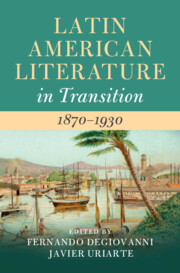Book contents
- Latin American Literature in Transition 1870–1930
- Latin American Literature in Transition
- Latin American Literature in Transition 1870–1930
- Copyright page
- Contents
- Figures
- Contributors
- Acknowledgments
- Introduction
- Part I Commodities
- Chapter 1 Rubber
- Chapter 2 Guano and Nitrates
- Chapter 3 Coffee
- Chapter 4 Plantains and Bananas
- Chapter 5 Sugar
- Chapter 6 Yerba
- Part II Networks
- Part III Uprisings
- Part IV Connectors
- Part V Cities
- Index
- References
Chapter 3 - Coffee
from Part I - Commodities
Published online by Cambridge University Press: 14 January 2023
- Latin American Literature in Transition 1870–1930
- Latin American Literature in Transition
- Latin American Literature in Transition 1870–1930
- Copyright page
- Contents
- Figures
- Contributors
- Acknowledgments
- Introduction
- Part I Commodities
- Chapter 1 Rubber
- Chapter 2 Guano and Nitrates
- Chapter 3 Coffee
- Chapter 4 Plantains and Bananas
- Chapter 5 Sugar
- Chapter 6 Yerba
- Part II Networks
- Part III Uprisings
- Part IV Connectors
- Part V Cities
- Index
- References
Summary
The production of coffee for export organized racial capitalism in Brazil and Colombia during the late nineteenth and the early twentieth century. The literary fiction from this period reveals an effort by the intellectuals of these countries to conceptualize their nations in the face of the organization of their national economies around deeply racialized modes of production. This chapter surveys a wide range of this fiction, including texts by José Bento Monteiro Lobato, Fernando González, Mário de Andrade, and José Restrepo Jaramillo. It also puts this fiction in dialogue with nonfictional texts such as essays by the Swiss-French writer Blaise Cendrars and the Colombian economist Alejandro López. The chapter shows that the imbrication of racialization and capitalism is particularly evident after the end of the coffee boom in 1929, when writers became more skeptical of the triumphalist narratives of the coffee industry.
- Type
- Chapter
- Information
- Latin American Literature in Transition 1870–1930 , pp. 44 - 58Publisher: Cambridge University PressPrint publication year: 2022

